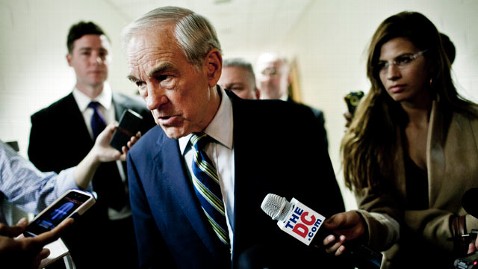Ron Paul's Not-So-Secret Plot for the GOP Convention

T.J. Kirkpatrick/Getty Images
For Ron Paul, it's no longer about becoming president.
His backup plan since January has been to use delegates as a bargaining chip to extract concessions at the GOP convention: a prominent speech or the inclusion of Paul's views in the party platform that will be approved in Tampa, Fla., in August. To some degree, his campaign is about influence and leverage.
"That's the fallback. If we don't pull it off and we're not in first place, yes, that would be a good goal," Paul told Fox News' Chris Wallace after the Iowa caucuses. "I run to win, and I have won a lot, but we also want to help direct the party and the country in a certain way, so that would be a very, very positive strategy to have an influence on the party."
For a long-shot candidate like Paul, success might be the mainstreaming of his ideology.
Even after collecting delegates at state conventions in Nevada and Maine this the weekend, Paul is no threat to Romney's nomination.
Paul, 76, can threaten one thing in Tampa: allowing his supporters to embarrass Romney at the convention, ruining the weekend as a multi-day infomercial for the GOP.
What would such a hubbub look like? As of now, the most drastic thing Paul's supporters can do in Tampa is make noise. Paul-supporting states will be represented on the convention's platform committee, but they'll be in a vast minority. Delegates can, however, make motions from the floor, and the convention chair (likely House Majority Leader John Boehner of Ohio, according to one source) must choose whether to recognize them. Paul's supporters could interject in proceedings to try to nominate him.
The Texas congressman is within reach, however, of being able to do much more.
That's because when they're not voting on the nominee, Paul's supporters can do whatever they want at the convention, regardless of whether they're bound to vote for Romney. It's in Paul's interest to select primary-state delegates that are friendly to him, even if Romney won those primaries.
In Nevada, for instance, 22 of the state's 25 delegates are Paul supporters. They will have to vote for Romney on the first ballot of convention voting, but those delegates can cause mayhem in other ways, if they like.
At the convention, a majority of delegates in six states can suspend the rules at any time, bringing about potential mayhem on the floor of the Tampa Bay Times Forum. With Nevada, and Maine, Paul now has the support of at least two delegations, with Minnesota and Missouri on the horizon as a possible third and fourth. He also might enjoy strong support from Alaska, where his supporters ousted the sitting party chairman at April's state convention.
He also has a mathematical shot at winning delegations from Indiana, Iowa, Kentucky, Louisiana, Michigan, Montana, Nebraska, New Mexico, Oregon and Vermont, which have yet to hold significant delegate-selecting conventions.
Paul's best hope of influencing the GOP platform might be filling out Romney's bound-delegate ranks with his own supporters, not because the convention will go to a second round of voting, but because being bound to Romney (or Rick Santorum or Newt Gingrich) won't prevent Paul backers from gumming up other parts of the proceedings.
If Paul supporters were to succeed at six state conventions, they could halt convention proceedings in Tampa and make motions on nearly anything from the floor under suspended rules, from changing the convention rules, to electing a new convention chairman, to offering up platform resolutions (which they can't do from the floor, under convention rules). If they aren't given a say in the GOP platform, Paul supporters could seek to obstruct its passage on the convention floor. (They would almost certainly fail, but it would look bad for Romney and the GOP.)
In some states, caucuses and conventions have turned testy with confrontations involving Paul backers. Romney and most Republicans won't want to see such a disturbance on the national stage.